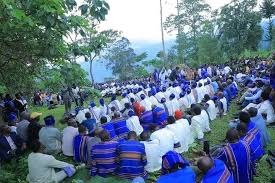
A running water knows no boundaries. Nearly forty percent of the world’s people live along river basins shared by more than two countries, Africa alone comprises of fifty-seven river and lake basins shared by at least two sovereign nations.
As scientific studies reported, that the total volume of water on earth would cover the globe to a height of 2.7 kilometers, if it were spread evenly over its surface, but more than ninety-seven percent is sea water. The remaining three percent of fresh water would still make up a layer seventy meters high, if it were spread evenly, but two-thirds are locked in icecaps and glaciers. Only 0.3percent of the three percent of fresh water is found in the rivers and lakes that constitute the bulk of our usable supply. From the above statistically aggregate view, we can understand that uneven distribution of water supply and demand make comparisons at the global or continental level, or even a single country.
Historically, upstream countries have been mainly characterized by economic underdevelopment, internal conflict, political instability, lack of external financial support, and combined with weak bargaining strategies. These weaknesses have undermined their position in Nile issues and affected their utilization of the Nile water.
Over the last decades, the Nile basin region has experienced several political and economic changes that are expected to promote shifts in the current balance of power in the basin and bear on hydro political relations between Egypt and the riparian countries.
The Nile River is considered to be the longest river in the world and 40% of Africa’s population live along its basin. In this watercourse, Ethiopia provides 85% of the Nile River waters. The politics of the Nile River basin, however, are full of tension, mistrust, anxiety, and diplomatic confrontation between the upstream and downstream riparian countries.
The problem of utilizing the water of the Nile is underscored by the nature of colonial era treaties. Dr. Yacob Arsano, a researcher on Nile river and assistant professor at Addis Ababa University, has divided the agreements relating to the utilization of the Nile into three categories; First, ‘Agreements between colonial powers.’ Second, ‘Agreements between colonial powers and regional states.’ Third, ‘Agreements among independent states of the basin’, and thisincludes the Comprehensive Framework Agreement (CFA) signed among the seven basin countries in 2010, as well.
Under British colonial supervision, the 1929 Nile Waters Agreement allocated 48 billion cubic mt. to Egypt. The revised Treaty of 1959 also increased Egypt’s share to 55 billion cubic mt. that had been clearing the ground for the construction of the Aswan High Dam which is the largest man made water reservoir on Earth. In contrast, this 1959 agreement created permanent tensions between Egypt and Ethiopia.
The asymmetric control of the Nile’s water resources is partially explained by the existence and persistence of three dimensions of power as classified by scholars, First, material power relates to the levels of economic development, military might, political stability, and access to external political and financial support. Second, bargaining power is determined by theability to control and influence the agenda.
Third, ideational power is determined by the ability to influence knowledge and construct discourse. Accordingly, Ethiopia has been the rising powerful riparian state in each of these dimensions.
In terms of ‘material power’, Ethiopia isstronger through its increasingly stable economies, foreign investment, and better relations with international donors. And in terms of ‘bargaining power’ it is also influentially involved in multilateral negotiations and has some ability to influence the regional agenda and even to pressurize the downstream riparian over the legal issues. Evidently, GERD has to a certain extent, contributed to changes in the balance of power in the hydro-political relations.
In the first quarter of 21st century, Ethiopia announced that it will press ahead with mega projects of dams on the Blue Nile, starting with the Grand Ethiopian Renaissance Dam (GERD), since then, it has also pursued an independent water management policy. Ethiopia considers the Nile River to be trans-boundary, meaning that it exercises exclusive sovereign authority to the Nile within its borders.
Talks between Egypt, Sudan and Ethiopia over operating the GERD and filling its reservoir have made no progress in the last five years. Additionally, in recent times, the Egyptian President had requested the US-President to mediate the parties over Nile disputes, in response to this, consecutive discussions were held at the presence ofIMF and US-Treasury authorities. As a result, an attempt was failed in bringing possible solutions. For Ethiopians, this intervention of international actors and their positions that have shown to favor Egypt’s interest, seems to invite alarmism.
The growing water needs of populations of the Nile region are expected to put increasing pressure on the scarce. In addition to this, the attainment of sustainable economic development, environmental well-being, and human security are not possible without cooperation among states and peoples that share river basins.
Well, the existence of GERD on Nile basin is a significant factor when considering future economic growth in riparian countries. For example, neighboring countries like Sudan, South Sudan, Kenya, Djibouti and Eritrea are likely to benefit from the power generated by the Ethiopian Renaissance dam. Besides benefiting from the power, Sudan has got an advantage that the flow of the river would be regulated by the dam, meaning it would be the same all year round. Usually Sudan suffers from serious flooding in August and September.
However, the Ethiopian government has recently announced its plan that filling the dam will start sooner, and it also expressed its willing to continue negotiations with Egypt and Sudan between themselves.
Here, my piece aims to suggest ideas that contribute to a better understanding of solving problems in the negotiations between Egypt, Sudan and Ethiopia will continue to play a significant role during their relations.
Notably, it is unforgettable that the AU has played a limited role in past water diplomacy efforts between Egypt and Ethiopia. The AU Commission has been involved in Nile matters through the aegis of the African Network of Basin Organizations (ANBO). It has developed policy and institutional framework guidelines with regard to cooperation for the sustainable management of trans-boundary water basins. In this regard, AU can help facilitate exchange and cooperation among experts, and provide a forum for transparent discussions. The AU may also help analyze state policies to identify common interests among the parties, which may serve as a beginning for negotiations.
Generally, in February 2015, Egypt, Sudan and Ethiopia reached a preliminary agreement on the Grand Ethiopian Renaissance Dam. This agreement is an important step towards strengthening the bilateral relationship between Egypt and Ethiopia. Commitment to expanding a mutual understanding in order to enhance the cooperation of Nile basin countries should be a priority for both Egypt and Ethiopia. Their role in the family of Nile basin nations should be active and positive.
Finally, since the Ethiopian government is highly committed to complete the construction of the dam which remained less than 30 percent of its work and even filling the dam is inevitable, Egypt may probably attempt to reverse this achievements through diplomacy or mighty.
Hopefully, Egypt will not prefer the second scenario rather looking for negotiation. However, the Ethiopian government should play indispensible role on water diplomacy with African states in general and with riparian countries in particular. Otherwise, to make clear for Egyptian leaders that no forces on earth, to reverse the aims of Ethiopia that to put poverty an end, and make it history. That’s why, the GERD is at the eyes of Ethiopians and it seems to be HEROIC ICON.
Editor’s Note: The writer can be reached at nantigi1990@gmail.com
The Ethiopian Herald May 26, 2020
BY TIGISTU AWELU HASSEN




